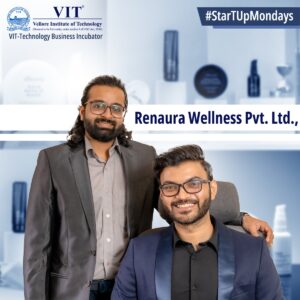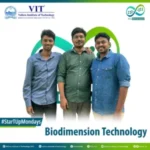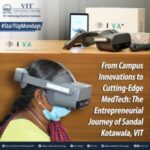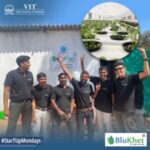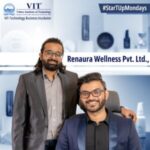Nishant Gupta and Palash Pandey were in the same batch of engineering at VIT. Nishant, who hails from Lucknow, joined the university for a Bachelor’s in Electronics and Instrumentation, while Palash, who hails from Indore, was in the Chemical Engineering Department. They met through a common friend and later became partners in a venture they co-founded. They observed the challenge with hard water that many people were facing. “Both in Lucknow and Indore, we were lucky to not have to deal with hard water issue. It is becoming an issue even there now. Every Indian city is facing the problem. We realised that this problem was widespread not just in India but in other countries, including the Gulf and the USA,” says Nishant.
The duo felt quite strongly about it. They wondered why there was no scientific solution to this problem. “Both of us like science and we felt that this was something we could work upon,” adds Nishant. They decided to work on finding a solution for this in the last year of their engineering course. Being in the Chemical Engineering Department, Palash got an opportunity to work on this in a different way. That gave them the confidence to take it forward as a project and a product. Nishant had been active in the entrepreneurship club at VIT and knew the people there, particularly Dr. A. Balachandran, Director, VIT’s technology business incubator (VIT TBI). The duo waited to graduate before they applied for incubation at VIT TBI. They were among the earliest student incubatees at the incubator. Nishant recalls with gratitude the support they received not just from VIT TBI, but from the university’s management.
They formed a company, Renaura Wellness Pvt. Ltd., in September 2015 to work on the problem they had identified. Nishant and Palash were first generation entrepreneurs. While Nishant’s father was a banker and mother a homemaker, Palash’s parents were government teachers. They realised they would have a lot to learn if they were to make a success of their venture. That is where being incubated at VIT TBI helped them enormously. Not only were they able to tap into the expertise of their professors at VIT, they learnt the ropes of establishing a company and running it thanks to being incubated at the TBI. They came to know about various government grants that they could apply for, VIT encouraged them to participate in various competitions and the network of mentors at VIT TBI hand-held them right through their initial days.
According to Nishant, the first money they got was from an MSME grant via the TBI. That was the first validation of their idea. In late 2017, when they were still working on the first product, they got the first round of external funding. In April 2018, Renaura Wellness launched its first product – a ‘Hard Water Shampoo’. “We had spent considerable time and energy in making sure the product delivered on what it promised. The important aspect was customer satisfaction,” says Nishant. They launched the product through salons, pitting themselves against foreign brands that dominated the professional salon hair care market. Nobody had a solution for hard water, says Nishant. They felt that educating the stylist in salons would help them reach their customers faster rather than selling direct to consumers through e- commerce marketplaces and retail stores. Besides, they had not raised a large round of funds that would be needed to market the product directly to individual customers. By this time, the company had also shifted base to Bengaluru. By July, they did a pilot of about 50 salons in Bengaluru to see if they were getting repeat customers and towards the end of the year, they launched their second product – a ‘Squalene Restorative Conditioner’. It is based on squalene, a natural lipid that the body produces, explains the 31-year-old Nishant.
Renaura – the name has been taken from the eastern Europe group of words, where ‘Ren’ connotes clean and fresh; Renaura is essentially a clean fresh aura around the individual, explains Nishant – now works with almost 3,000 salons in more than 70 cities in the country. “We are trying to grow our footprint and become a genuine alternative that is the choice for the salon segment, differentiated by science and differentiated by the kind of R&D we are putting into the products,” says Nishant. From the first product that was focussed on hard water, the company has diversified its range into unique offerings for hair and personal care under the brand name Iluvia, which name has been inspired by the Spanish word ‘luvia’ that means rain, explains Nishant.
Just as things were picking up in 2019, the Covid pandemic struck in early 2020 and Renaura was quick to adapt and came up with a gel-based sanitiser that it supplied to a number of Government of India offices and establishments. Once things started opening up in 2021, their focus was back on the hair and personal care products. They raised a fresh round of funds and the company, says Nishant, is now on a growth trajectory. “Our focus is on the professional care segment. A significant portion of our revenues come from the salon channel. We are not just a D2C brand, our major spread is via the professional offline ground network that we work with. We have been trying to grow that because we feel it is a much more important space and it is a difficult space for an Indian brand to be able to crack and be a genuine competitor and alternative to the traditional leaders in the market,” says Nishant.
He emphasises that theirs is an R&D-led company that comes up with differentiated products, which is what is helping them succeed in a highly competitive market. The company, he adds, has been working on some unique technologies that will allow it to establish a strong presence in India and also come up with innovations that are meaningful at a global level. “We do have aspirations and hope to take these innovations to the rest of the world and demonstrate that Indian R&D and technology are second to none,” asserts Nishant.

